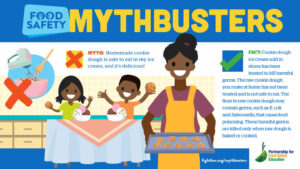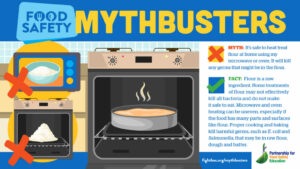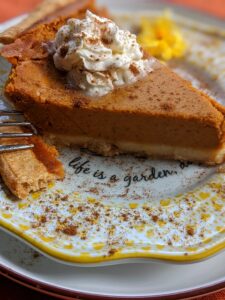Holiday Food Myths Busted
go.ncsu.edu/readext?974091
en Español / em Português
El inglés es el idioma de control de esta página. En la medida en que haya algún conflicto entre la traducción al inglés y la traducción, el inglés prevalece.
Al hacer clic en el enlace de traducción se activa un servicio de traducción gratuito para convertir la página al español. Al igual que con cualquier traducción por Internet, la conversión no es sensible al contexto y puede que no traduzca el texto en su significado original. NC State Extension no garantiza la exactitud del texto traducido. Por favor, tenga en cuenta que algunas aplicaciones y/o servicios pueden no funcionar como se espera cuando se traducen.
Português
Inglês é o idioma de controle desta página. Na medida que haja algum conflito entre o texto original em Inglês e a tradução, o Inglês prevalece.
Ao clicar no link de tradução, um serviço gratuito de tradução será ativado para converter a página para o Português. Como em qualquer tradução pela internet, a conversão não é sensivel ao contexto e pode não ocorrer a tradução para o significado orginal. O serviço de Extensão da Carolina do Norte (NC State Extension) não garante a exatidão do texto traduzido. Por favor, observe que algumas funções ou serviços podem não funcionar como esperado após a tradução.
English
English is the controlling language of this page. To the extent there is any conflict between the English text and the translation, English controls.
Clicking on the translation link activates a free translation service to convert the page to Spanish. As with any Internet translation, the conversion is not context-sensitive and may not translate the text to its original meaning. NC State Extension does not guarantee the accuracy of the translated text. Please note that some applications and/or services may not function as expected when translated.
Collapse ▲Remember that old television show called MythBusters? It focused on popular beliefs, old wives tales, internet rumors and other myths. The show then tests—based on science—to determine if the myth was true or not. The show has been off the air for several seasons. But I’d like to share some MythBusters about holiday baking and special foods.
Myth #1 – Homemade cookie dough is safe to eat in ice cream.
 Busted: Cookie dough ice cream sold in stores has been treated to kill harmful germs. The raw cookie dough you make at home has not been treated and is not safe to eat without being cooked. The flour in raw cookie dough may contain pathogens such as E. coli and Salmonella that cause food poisoning. These harmful pathogens are killed only when raw dough is baked or cooked.
Busted: Cookie dough ice cream sold in stores has been treated to kill harmful germs. The raw cookie dough you make at home has not been treated and is not safe to eat without being cooked. The flour in raw cookie dough may contain pathogens such as E. coli and Salmonella that cause food poisoning. These harmful pathogens are killed only when raw dough is baked or cooked.
Myth #2 – My kids love to taste the dough or batter as we bake it. Just one bite won’t hurt them or make them sick.
Busted: It’s not worth the risk. Wheat comes from the farm, so it is minimally
processed and then packaged for use. Because it is raw, flour may contain harmful
germs such as E. coli and Salmonella that can cause food poisoning–especially in
children under 5 years old. E.coli infections may lead to hemolytic uremic syndrome, a severe chronic kidney disease that may result in kidney failure and death. You can keep children safe by baking raw dough and batter before eating. Some companies make edible cookie dough and brownie batter that you can find in stores. These products are made with heat-treated flour and pasteurized eggs or no eggs. Read the label carefully to make sure the dough is meant to be eaten without baking or cooking.
Myth #3 – It is safe to heat treat flour at home using the microwave or oven. It will kill any pathogens that might be in the flour.
 Busted: Flour is a raw ingredient. Home treatments of flour may not effectively kill a bacteria and do not make it safe to eat. Microwave and oven heating can be uneven, especially if the food has many parts and surfaces like flour. Proper cooking and baking kill any harmful pathogens that may be in the raw flour dough or batter.
Busted: Flour is a raw ingredient. Home treatments of flour may not effectively kill a bacteria and do not make it safe to eat. Microwave and oven heating can be uneven, especially if the food has many parts and surfaces like flour. Proper cooking and baking kill any harmful pathogens that may be in the raw flour dough or batter.
Myth #4 – Many holiday goodies contain eggs and some of these foods are served raw or only slightly cooked. This is safe because we’ve always done it this way and no one has gotten sick, yet.
Busted: While the risk is small, there is may be disease causing bacteria in raw eggs. This risk is greater for pregnant women, young children, people who are immune compromised and the elderly. Guests at your home for the holidays may fit into these categories and it’s not worth the risk of possibly making them sick. Someone may have eaten something their whole life and not gotten sick, but they are older now and their immune system may be weaker. To avoid problems, use store-bought products which have been cooked or pasteurized. Also look for revised recipes that heat the foods thoroughly. Pasteurized eggs can be used when making recipes that are not cooked such as mousse, eggnogs, custards and macaroons. Pasteurized eggs are heat-processed to kill harmful bacteria. They can be purchased at more grocery stores. While more expensive, these pasteurized products can allow you to use family favorite recipes without the risk.
Myth #5 – Pumpkin pie does not need to be refrigerated. I see it sitting out at the grocery store—so it must be safe.
 Busted: Pies purchased at room temperature at a grocery store may be stored at room temperature at home. According to the USDA, all homemade pies that contain eggs and dairy such as pumpkin, pecan, custard, and meringue pies need to be refrigerated after they have been baked and cooled. Homemade pumpkin pie can be left at room temperature for two hours, after which it is in danger of growing harmful bacteria. Grocery store pies may contain preservatives which allows them to be safe at room temperature. Check the labels on store-bought pies, some are preservative-free and are kept cold in the store before purchase. You should do the same when you get it home.
Busted: Pies purchased at room temperature at a grocery store may be stored at room temperature at home. According to the USDA, all homemade pies that contain eggs and dairy such as pumpkin, pecan, custard, and meringue pies need to be refrigerated after they have been baked and cooled. Homemade pumpkin pie can be left at room temperature for two hours, after which it is in danger of growing harmful bacteria. Grocery store pies may contain preservatives which allows them to be safe at room temperature. Check the labels on store-bought pies, some are preservative-free and are kept cold in the store before purchase. You should do the same when you get it home.
Sources: Partnership for Food Safety Education and Safe Plates Information Center at NC State University.
Syracuse is a Family and Consumer Science team member and can be reached at N.C. Cooperative Extension, Brunswick County Center 910-253-2610 or by email at
Cheryle_Syracuse@ncsu.edu



